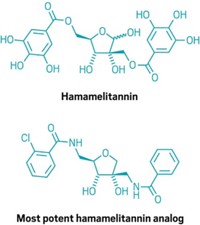Advertisement
Grab your lab coat. Let's get started
Welcome!
Welcome!
Create an account below to get 6 C&EN articles per month, receive newsletters and more - all free.
It seems this is your first time logging in online. Please enter the following information to continue.
As an ACS member you automatically get access to this site. All we need is few more details to create your reading experience.
Not you? Sign in with a different account.
Not you? Sign in with a different account.
ERROR 1
ERROR 1
ERROR 2
ERROR 2
ERROR 2
ERROR 2
ERROR 2
Password and Confirm password must match.
If you have an ACS member number, please enter it here so we can link this account to your membership. (optional)
ERROR 2
ACS values your privacy. By submitting your information, you are gaining access to C&EN and subscribing to our weekly newsletter. We use the information you provide to make your reading experience better, and we will never sell your data to third party members.
Biological Chemistry
Heartburn Drug Lansoprazole May Fight Tuberculosis Too
Drug Discovery: Researchers find that a metabolite of the FDA-approved medicine kills Mycobacterium tuberculosis in human cells
by Judith Lavelle
July 20, 2015
| A version of this story appeared in
Volume 93, Issue 29
The over-the-counter drug lansoprazole—Takeda’s Prevacid—has long been used as a treatment for frequent heartburn. But new research suggests the proton pump inhibitor, which limits the stomach’s manufacture of gastric acid, may also be a prodrug for a compound effective against Mycobacterium tuberculosis, the bacterium that causes tuberculosis (TB). Because of increasing drug resistance, there is a pressing need for new TB drugs. So researchers led by Stewart T. Cole of the Swiss Federal Institute of Technology (ETH), Lausanne, developed a new method of high-throughput screening to test a set of FDA-approved drugs for activity against the bacterium (Nat. Commun. 2015, DOI: 10.1038/ncomms8659). Although most screens look for antimicrobial activity in a bacterial broth, the new method screens assay results on fibroblasts to better address intracellular M. tuberculosis found in the body. In cells, lansoprazole undergoes sulfoxide reduction, and its metabolite, lansoprazole sulfide, kills the bacterium. When Cole’s team orally administered lansoprazole sulfide to infected mice, severity of the TB infections was significantly reduced. “This is a very exciting paper that demonstrates the importance of rescreening old FDA-approved drug libraries using new techniques,” says Eric Oldfield, a TB researcher at the University of Illinois, Urbana-Champaign.




Join the conversation
Contact the reporter
Submit a Letter to the Editor for publication
Engage with us on Twitter